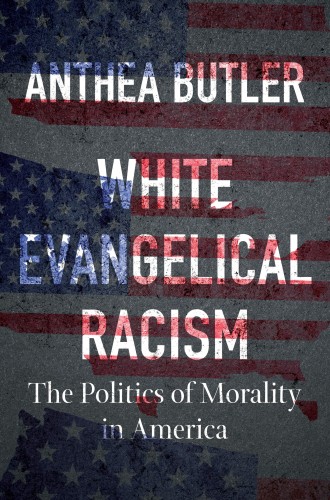A Black scholar’s challenge to White evangelicals
Anthea Butler is clear about the disastrous legacy of racism at the heart of White evangelicalism.
I distinctly remember my Introduction to Church Doctrine course at a well-known evangelical Bible college. The professor handed out the syllabus to a classroom filled with wide-eyed freshmen eager to see which theologians we would study throughout the semester. I scanned the pages and noticed that there was not a single author of color listed. As the professor clicked through a presentation of the theologians we would read, my suspicion was confirmed: each slide contained a white man, often sporting a long beard and a scholarly cap. I wondered if evangelical theology was uninfluenced, unaffected, and unconcerned with non-White experience, with my experience.
Anthea Butler answers that question with a bold yet somber, “Yes!” In White evangelical spaces, she argues, the experiences and concerns of non-White folks are often unseen, unheard, and unrepresented.
White Evangelical Racism is an excellent and scathing critique of American evangelicalism. Butler argues that racism is not a bug in the system of evangelicalism but rather a distinctive feature of the tradition. As a person of color invested deeply in the redemption and reformation of American evangelicalism, reading Butler’s brief history brought me through a range of emotions: anger, gladness, fury, joy, sadness, hope. The text bears the scars of Butler’s experience as a former evangelical, a story which she includes in the book. Her historical analysis does not claim to be detached from her own story—it is, rather, deeply personal and experiential.
Read our latest issue or browse back issues.
This is evident in the very style and format of the text. Butler forgoes academic language, citations of paywalled journal articles, and an in-depth historical narrative in favor of telling a larger story that, in a few short chapters, connects the past to the present. Her ability to weave together history, personal experience, and contemporary reflection in such a cohesive and approachable manner makes White Evangelical Racism stand out among the numerous critiques of evangelicalism published over the past several years. Butler’s contribution to this discourse is not found in unearthing lost stories buried in archives or journals but in her own commentary on an evangelical history that most Christians are already aware of or have even participated in.
However, evangelical readers ought not mistake Butler’s approachable and informal commentary for a friendly tone or sympathetic position. Butler is clear: evangelicals have brought this disastrous history and its consequences upon themselves. This is a time of reckoning, not hand-holding.
Recognizing the ambiguity of the evangelical label, Butler notes early in the text that when she refers to evangelicals, she is specifically speaking to White evangelicals. This distinction, however, is quickly blurred when she comments broadly on American evangelicalism’s marriage to Whiteness. Read charitably, I think Butler’s interchangeable terminology speaks to the felt tension of evangelicalism today. Who are evangelicals? Who represents their values and beliefs?
To be sure, Butler’s commentary primarily concerns the interwoven lineage and consequences of White evangelicals and fundamentalists like Billy Graham, Pat Robertson, the Falwell family, and Bob Jones. However, Butler also briefly recognizes evangelicals who made significant contributions to the abolitionist movement, Reconstruction, prison reform, and civil rights. By critiquing and unequivocally condemning White evangelical racism while also acknowledging another evangelical lineage, Butler presents masterful critique while still providing space for a much-needed nuance often missed when speaking about the tradition in America as a whole.
Butler argues her thesis by analyzing American evangelicalism’s theological foundations, prominent leaders, and sociopolitical formation up to 2016. She begins by examining the flawed foundation of the evangelical tradition: its reading of the Bible. White evangelicals, steeped in racial bias and presuppositions about Black folks, used scripture to uphold the institution of slavery and to support movements like the Lost Cause, the White League, and the Ku Klux Klan.
She then turns her commentary to Billy Graham, using his ministry and commitment to Americanism as a framework for understanding the new evangelicalism that emerged out of World War II and the fundamentalist-modernist controversy of the early 20th century. “By looking at the new evangelicalism through the lens of Billy Graham and his contemporaries,” Butler writes, “we see a clear picture of the lines that evangelicals drew around racial, social, and political issues.”
This leads directly into a section on evangelicals’ political involvement as the “moral majority.” While many consider evangelicals’ position on abortion to be the catalyst of their political activism, Butler argues that it was, in fact, racism that led White evangelicals to unite their faith to the Republican Party. She points to how this racist foundation for political involvement manifested in White evangelicals’ responses to 9/11 and the election of President Barack Obama, which involved embracing and propagating Islamophobia and joining in slander and conspiracy concerning Obama’s upbringing and fitness for office. A few years later, this rhetoric would culminate in a new figurehead, a modern-day King Cyrus: Donald J. Trump.
Five years ago, Butler petitioned an auditorium full of evangelicals at Fuller Theological Seminary to write histories of evangelicalism told from the perspective of Black and Brown bodies. Since then, historians from numerous evangelical backgrounds have taken up the task of critiquing their history. Still, there remains a reflexive defensiveness in too many corners of the evangelical world.
For those evangelicals who remain defensive, Butler concludes her text with another petition: “Whom will you serve?” This question echoes the experiences of many people of color who are tired of investing, serving, leading, teaching, and discipling in White evangelical spaces only to remain invisible and devoid of any meaningful power or equity. As Butler documents throughout her book, White evangelicals have historically embraced power and social clout at the expense of genuine community and neighbor love. Appeals to racial equality and civil rights are usually stipulated, and the generational trauma and scars that Black and Brown people bear at the hands of self-proclaimed evangelicals are rarely acknowledged from the pulpit or lectern.
In the best of ways, Butler’s text left me wanting more. Butler is clear about the parameters of the historical lineage she is commenting on. Yet it would be fascinating to hear her thoughts and commentary on the various threads of evangelicalism that are explored in texts like Kristin Kobe Du Mez’s Jesus and John Wayne, Aaron Griffith’s God’s Law and Order, and David R. Swartz’s Moral Minority. I hope that Butler will have the space in another publication to engage with the global practice of evangelicalism and the significance of non-White and left-leaning evangelical communities in the United States.
White Evangelical Racism is certainly written for a broad audience, and Butler’s culminating appeal to evangelicals makes it required reading for evangelical undergraduate courses and local church book groups. If read in a diverse community, this book offers evangelicals the opportunity to address both the history of American evangelicalism and the diverse experiences of American evangelicals across numerous social locations.
The question remains if evangelicals are willing to take up Butler’s call and do this work internally, or if historians and scholars outside the tradition will do this work without them. If evangelicals are going to do so, the time, Butler assures her reader, is now.







